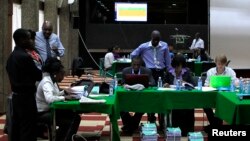NAIROBI —
The chief executive of Kenya's electoral commission was charged on Wednesday over a $15 million tender for equipment that was meant to prevent vote fraud during March's presidential election but broke down during the count.
The new technology was aimed at avoiding the violent disputes that led to 1,200 deaths after the election five years ago. Previous votes in Kenya have also been dogged by “ghost” voters, stuffed ballot boxes and rigging of the final tally.
As well as biometrically testing voter identity, the $15 million system was meant to transmit the number of votes cast to a central tallying center - unlike in the past, when votes were ferried manually from polling stations, increasing the chances of tampering.
However, the collapse of both parts of the system led to a very slow release of results, stoking speculation the vote had been rigged and leading to an unsuccessful legal challenge to President Uhuru Kenyatta's victory.
James Oswago, the CEO of the Independent Electoral and Boundaries Commission, and three other officials were accused at Kenya's anti-corruption court of being behind the $15.26 million tender to purchase the equipment.
The accused were charged with four counts of abuse of office and failing to comply with procurement regulations, as well as failing to inspect and confirm that the devices supplied were in good working condition.
Oswago, his deputy Wilson Shollei, director of finance Edward Karisa and procurement manager Willy Kamanga pleaded not guilty to the charges and were released on bail pending an appearance on Nov. 14.
The failure of the system was cited by Kenyatta's rival, Raila Odinga, as one of the grounds for his legal challenge.
While the Supreme Court did confirm Kenyatta's election, it also ordered an investigation into the procurement of the biometric voting and electronic system.
Oswago was arrested on Tuesday by officials from the Ethics and Anti-Corruption Commission for interrogation.
The new technology was aimed at avoiding the violent disputes that led to 1,200 deaths after the election five years ago. Previous votes in Kenya have also been dogged by “ghost” voters, stuffed ballot boxes and rigging of the final tally.
As well as biometrically testing voter identity, the $15 million system was meant to transmit the number of votes cast to a central tallying center - unlike in the past, when votes were ferried manually from polling stations, increasing the chances of tampering.
However, the collapse of both parts of the system led to a very slow release of results, stoking speculation the vote had been rigged and leading to an unsuccessful legal challenge to President Uhuru Kenyatta's victory.
James Oswago, the CEO of the Independent Electoral and Boundaries Commission, and three other officials were accused at Kenya's anti-corruption court of being behind the $15.26 million tender to purchase the equipment.
The accused were charged with four counts of abuse of office and failing to comply with procurement regulations, as well as failing to inspect and confirm that the devices supplied were in good working condition.
Oswago, his deputy Wilson Shollei, director of finance Edward Karisa and procurement manager Willy Kamanga pleaded not guilty to the charges and were released on bail pending an appearance on Nov. 14.
The failure of the system was cited by Kenyatta's rival, Raila Odinga, as one of the grounds for his legal challenge.
While the Supreme Court did confirm Kenyatta's election, it also ordered an investigation into the procurement of the biometric voting and electronic system.
Oswago was arrested on Tuesday by officials from the Ethics and Anti-Corruption Commission for interrogation.





